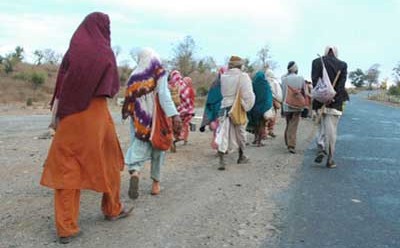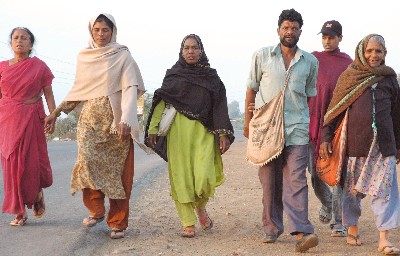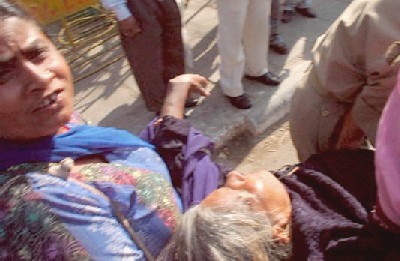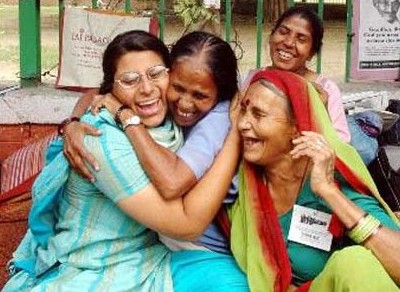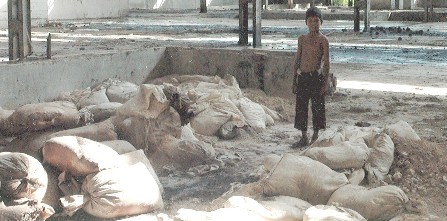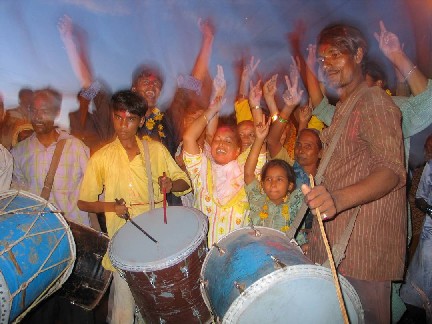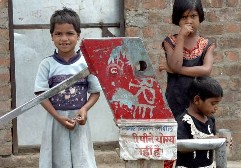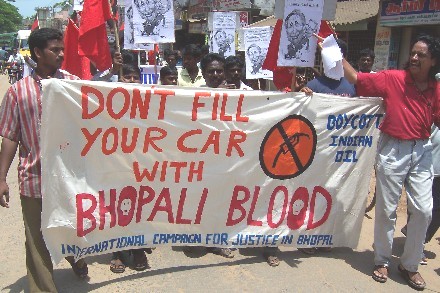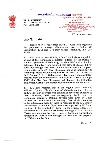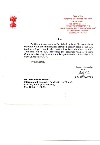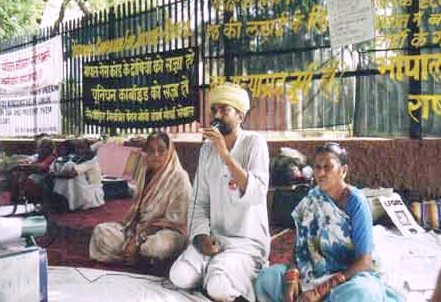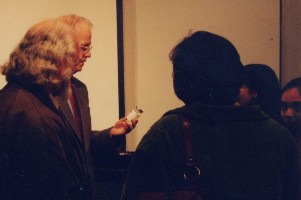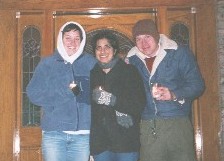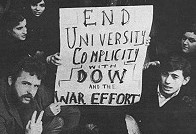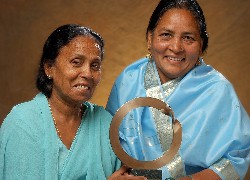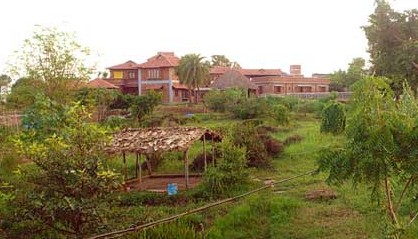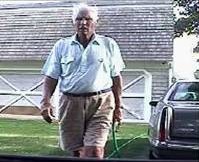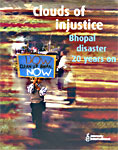Since it was founded in 2003, Students for Bhopal has grown exponentially. Now active at 70 high schools, colleges and universities around the world, Students for Bhopal represents a major threat to Dow’s business and reputation at home and abroad, and the reincarnation of the mass student movement that tarred Dow during the Vietnam War.
On February 20, 2006, several dozen Bhopal survivors – sickened and poisoned already by Carbide’s chemicals – began a grueling five-week, 500 mile walk to New Delhi through the blistering heat of central India. Their aim? To meet the Prime Minister and personally present the demands for justice and a life of dignity which they've been making for more than two decades. Obviously, they felt, their lives were not a priority for the government. They decided to make it one. On arriving in Delhi the government arranged for a brutal welcome: more than 300 riot police descended on the Bhopalis during a peaceful protest outside the Ministry of Chemicals, beating old women (including Ashraf Bee, 60, who was kicked in the chest, stomped on, and hospitalized in serious condition: right) and imprisoning the demonstrators (including more than 30 children). A howl of outrage from Bhopal supporters around the world soon led to their release, but the government still refused to meet any of their demands, and the Prime Minister refused to see them. On April 11, the Bhopalis decided they’d had enough, and six survivors and Bhopal supporters declared they would starve themselves until the government agreed to act. Simultaneously, a worldwide support effort – organized and coordinated by students – was putting the government under intense pressure. More than 3000 faxes were sent directly to the Prime Minister’s office in Delhi; 6000 emails and hundreds of phone calls inundated every Indian Government office in the United States and many in India. Protests shook the Indian Embassy in Washington and the consulate in New York; supporters met with the San Francisco Consulate, the Consul General and DCG of the Houston Consulate, and confronted the New York Consul General at two separate speaking engagements in Boston. Nationwide vigils were held across the United States the day the Bhopalis began their fast, and more than 350 people from around the world joined the Global Relay Hunger Strike in solidarity. Countless events - including skits, movie screenings, photo exhibits, and demonstrations – were held and nearly 700 people signed our petition to the Prime Minister. Finally, more than 50 groups - including over 30 local and national Non-Resident Indian organizations - signed on to a letter demanding action from the Indian Government, and 20 members of the United States Congress – led by Rep. Frank Pallone of New Jersey – did the same (pdf). The pressure worked. On April 17, Prime Minister Manmohan Singh met with the Bhopalis and agreed to four of their six demands: 1. National Commission on Bhopal: The
Government should set up an interministerial coordinating agency,
with necessary authority and funds to provide facilities for health
care, medical research, social support and economic rehabilitation
of the people poisoned by Union Carbide/Dow Chemical and their children
for at least the next 30 years. This commission must have the active
participation of non-government doctors, scientists and representatives
of survivors’ organisations.
In April, 2004, the 2nd Circuit Court of Appeals in the United States ruled (the first time any court has done so) that a multinational corporation based in one country could be held responsible there for an environmental cleanup abroad. Holding Union Carbide responsible for a comprehensive cleanup in Bhopal became a possibility – but there was one catch. Since the Indian Government held title to the land, the court ruled that the permission of the government was needed before any cleanup could be enforced. For the Indian Government, the decision should have been common-sensical: after all, if Union Carbide wasn’t held liable, the Indian Government would probably have to foot the ~$500 million bill itself. Yet the Government appeared strangely reluctant to submit the necessary No Objection Certificate (NOC) to the court. With a June 30th deadline approaching, Students for Bhopal and other supporters from around the world swung into action. A major fax campaign, coordinated by Students for Bhopal and the Association for India’s Development (AID), deluged the government with literally thousands of faxes – a massive outpouring of support. Within days the government began to backtrack, and we heard word that the issue was being discussed in the Prime Minister’s Office. Yet, the pressure continued: call-in days were organized, emails sent; AID chapters (Houston, College Park, Princeton) and others organized multiple protests outside Indian consulates across the United States; and a 6 day hungerstrike (three days waterless) by Bhopal survivors in New Delhi was supported by AID members (particularly AID Cincinnati) and 300 others around the world. The pressure worked. Within days, we heard that the Government had reversed itself, and would be submitting the necessary NOC to the court. It is now the official policy of the Indian Government that Dow must be held liable for a comprehensive cleanup in Bhopal.
For years the Indian Government had been slowly distributing the $470 million in settlement money that Union Carbide paid the government in 1989 to resolve civil claims stemming from the disaster. The rate of distribution was so slow, in fact, that by the time the money had been fully distributed, more than $330 million remained in the fund – interest on the original settlement, accumulated over time. For years, survivors had claimed that money as their own, yet the government seemed intent on spending it elsewhere. In January 2004 the survivors vowed to increase the pressure on the government to yield and distribute the funds to those who needed them most. Students for Bhopal and the Association for India’s Development contributed to this effort by launching an international Day of Action on February 24, 2004. Consulates in the US were besieged with hundreds of phone calls and emails; in Canada, students at McGill University wrote letters to the High Commission of India in Canada to demand action; fifteen students in India met simultaneously with the Governor of the state of Madhya Pradesh, and presented him with a petition demanding the same; while in New Delhi, students met with the President of India to present the demands and asked for his support. Again, the pressure was successful, and in July 2004 the Supreme Court ruled that all the remaining funds should be given to the survivors. That process is now ongoing in Bhopal, while monitors coordinated by survivor groups attend the courts and record irregularities and complaints of corruption.
In May 2004, the Supreme Court upheld another key demand of the campaign by ordering the State Government of Madhya Pradesh to supply those living near the factory with clean drinking water. Due to Union Carbide’s contamination of the aquifer near the plant, more than 20,000 nearby residents were forced to drink water laced with carcinogenic and mutagenic chemicals – poisoning those, very often, who’d been gassed by Carbide’s chemicals before. Lacking access to any alternative source of water, those forced to drink the chemical brew demanded a permanent, piped supply of safe water from the State Government. On May 7th the Supreme Court agreed, ruling that the Government should begin ‘as soon as possible’. Unfortunately the State Government has not acted, interpreting the Supreme Court’s directive as an open-ended invitation to act when they felt moved to do so. Yet the pressure has been building. A massive fax action coordinated by Students for Bhopal and the Association for India’s Development has generated more than 1000 faxes to the State Government. All this pressure has forced them to move – if slowly – by supplying water through tankers, on an irregular basis. No one believes this is enough – the supply in February 2005 was a little over 125,000 litres per day, or just 14% of the UN’s daily water requirement – but our pressure continues for a permanent, piped water supply.
On October 28, 2005, Dow Chemical’s business expansion plans in India suffered their first serious setback after a campaign by Bhopal survivors resulted in a dramatic reversal, and the Indian Oil Corporation (IOC) cancelled its decision to purchase technology from Dow for its proposed mono ethylene glycol plant in Panipat, India. In an official letter, the Ministry of Petroleum confirms the deal was cancelled because of Dow's "misrepresentation of facts" to the Indian Government. "Initially, it was believed that Dow Chemicals did not have any linkage with M/s Union Carbide...however, based on clarifications furnished by Dow Global Technology Inc., it now emerges that the Process Design Package was prepared by UCC and not by Dow." Dow had conveyed to the Indian Oil Corporation that the technology in question was a patented Dow technology, developed and marketed by Dow. However, Bhopal campaigners unearthed and presented evidence to the Government and IOC that confirmed that the Meteor technology remains a patented Union Carbide technology. In their response to IOC, Dow officials have alleged that the cancellation of the deal has caused a loss of $1.5 million.
In November 2004, after catching wind of the still-secretive deal between Dow & IOC, Bhopal survivors and their supporters launched a nationwide campaign demanding the blacklisting of Dow Chemical by the Government, and protesting against Indian Oil’s proposal to do business with a company that has refused to address its pending Bhopal liabilities. The campaign included a nationwide boycott of IOC’s petrol pumps, as people were asked not to fill their cars with Bhopali blood. Survivors also wrote letters to the Prime Minister in their own blood, calling for the cancellation of the contract between Dow and IOC. In Chennai, We Feel Responsible, a major chapter of Students for Bhopal, and other supporters led a rally from Mayiladuthurai Petroleum Minister Mani Shankar Aiyar’s constituency against the proposed deal.
Although Dow has earmarked South Asia as a critical region for future growth, the Bhopal campaign has hindered Dow's ability to pursue new business in India. "Fearful of Bhopal-related asset claims, Dow has not invested in new plants in India since acquiring Carbide in 2001," Chemical & Engineering News wrote in January 2007. In June 2002, in temperatures that touched 140 F, three people sat down outside the Parliament building in Delhi to begin an indefinite fast. The three hunger strikers were Tara Bai and Rashida Bee, both victims of Carbide's gases, and Bhopal activist Satinath Sarangi.
The reason? The Indian government, acting through the Central Bureau of Investigation (CBI, India's equivalent of the FBI) decided to reduce the long-standing and unanswered criminal charges against Warren Anderson, former CEO of Union Carbide. Anderson had been charged with culpable homicide, a criminal offence carrying a maximum sentence of ten years in jail. However the government decided to downgrade this to committing "a rash and negligent act", reducing 20,000 deaths to the legal equivalent of a traffic accident. The attempt inspired outrage around the world. Protests were held outside Indian embassies and offices in New York, Washington DC, Cape Town, Madrid and other places. In London a 1000-signature petition was handed to the Indian High Commission. In Venice, Deputy Mayor Gianfranco Bettin and members of his administration undertook a three-day fast to support the Delhi hunger strikers. Groups and individuals protested in Stockholm, Amsterdam, Ramatuelle and Castelfranc in France. In the USA there were actions in Texas, Louisiana, Delaware, Ohio, Oregon, California, Florida and elsewhere. Meanwhile in India, large rallies in Chennai, Bangalore and Baroda echoed the hunger strikers' demands. In New Delhi, a mass rally of survivors and their supporters, including Arundhati Roy, marched on Parliament to support the Bhopalis. At this rally, Tara and Rashida – gassed by Carbide, sickened by their exposure, weakened by their fast – became faint and collapsed, and were rushed to the hospital. Despite the protests, the Government went ahead with its application to the Chief Judicial Magistrate’s court on 17 July. However the Court accepted a counter-submission from the survivors' organisations and adjourned the case until 27 August. The Delhi hunger strikers broke their fast, but it was taken up immediately as a Global Relay Hunger Strike by people around the world. This included Diane Wilson, an environmental activist and former shrimper who launched her own indefinite fast outside Union Carbide’s Seadrift, Texas facility (it lasted 29 days, and you can read more about it here). More than 1000 people participated around the world: an effort that ended in victory when, on 27 August, the judge case threw out the application and instead ordered the CBI to stop wasting the court's time with frivolous motions. He further instructed the Indian government to apply for Anderson’s extradition without further delay. Though Anderson’s extradition from the US was requested in 2004 and rejected in 2005, he still remains in legal jeopardy and faces trial and prison should he ever again set foot on Indian soil. In 1994, the Indian Council of Medical Research (ICMR), which had been conducting several comprehensive health studies in the wake of the Bhopal disaster, abruptly ended its studies and refused to release the results. Ever since then, Bhopal’s survivors have been campaigning for a resumption of medical research, and in March of 2005, with the scale and severity of the medical catastrophe continuing to grow, the Indian Government finally agreed. ICMR has been given the authority to restart its medical research, to undertake new studies at its discretion, and to review treatment protocols and computerize patient medical records to improve the quality of care for all gas victims. On May 11, 2006, Harold Shapiro, a member of the Dow Board of Directors, tendered his resignation. The obvious question is why: after all, Mr. Shapiro had served on the Dow Board longer than any other Board member, since 1985. Nor was Shapiro any wilting flower; rather he served as President of prestigious institutions such as the University of Michigan and Princeton University, and cultivated exceptional reputations in such fields as economics and bioethics. Nor does Dow compensate its Board members lightly for their troubles, particularly those who, like Mr. Shapiro, chaired Board committees and played leading roles within the corporation.
So we’re left with a bit of a mystery. Could it be that Mr. Shapiro had an attack of conscience after so long, and suddenly began applying the ethical pedigree he’s so well known for to his own behavior? Unlikely. Students and other Bhopal supporters have been visiting Mr. Shapiro regularly since the year 2000; in every instance they’ve found him desperately unwilling to discuss the subject, learn more about the issue, or take any ethical stand. On May 6, Students for Bhopal launched an international fax campaign demanding that Shapiro renounce his hypocrisy and end his role in the contamination, suffering, and deaths of thousands. Within days more than 400 faxes flooded his office; five days after the action began, he abruptly resigned. Nor was Shapiro’s resignation the first Dow executive SfB had contributed to toppling. On December 1, 2005, several Bhopal supporters surprised William Stavropoulos, Chairman of the Dow Board, at home. He appeared agitated, refused to speak with the small group of students, and desperately dialed both his private security service and the Midland police for help. According to some accounts, Stavropoulos was so frightened that he urinated in his clothes. A mere twelve days later, on December 13, Stavropoulos announced his intention to resign as chairman of the Dow Board. The first time students visited the home of a Dow executive was in 2002, when about a dozen students and Bhopal supporters from the University of Michigan traveled to Dow’s hometown of Midland to confront Michael Parker, the CEO. They were surprised to find him hosting a lavish party on the anniversary of Bhopal; 15 minutes of persistent student questioning soon found him exasperated, angry, and finally yelling. A videotape of the encounter was posted on the Greenpeace website; nine days later – on December 12, 2002 – Parker was fired by the Dow Board, which cited “financial reasons”.
On December 3rd, 2003, the 19th anniversary of the Bhopal disaster, the Board members of Dow Chemical had a decision to make. The 14 members of the Board – including several CEOs, a former US Secretary of Commerce, a MacArthur “genius” award winner and the former President of Princeton University – knew that small groups of students would be appearing at their doors that evening, delivering samples of contaminated drinking water from Bhopal. So they each spent some time thinking about how they should respond. They had two choices, they reflected – they could open the door, explain how terrible they felt about Bhopal (it had ruined their whole day) and politely decline the water, or they could flee – running up the stairs, closing the shades, turning off the light and squeezing (perhaps) under the bed. You guessed it: they chose to flee like frightened animals – fourteen of the nation’s most powerful industrialists brought low by a few students, some Bhopal water, and a just cause. No matter: the students left the contaminated water on their doorstep – really, the place where it belongs. After they left, the Board members crawled out, furious that Bhopal had invaded their lives. (This was, of course, the point.) They thought about the students and how to make them stay away – and where to hide again if they ever came back.
At four colleges and universities – the University of Michigan (March, 2003), Wheaton College (April, 2003), the University of California, Berkeley (December, 2004) and the University of Texas, Austin (February 2006) – student governments have passed resolutions condemning Dow and urging their schools to sever all ties with the company unless it resolves its responsibilities in Bhopal. Berkeley’s resolutionwas the first to call explicitly for divestment, recognizing Dow as the moral equivalent of Big Tobacco and Apartheid. Not only does this new movement bear an uncomfortable resemblance to the student protests that expelled Dow from college campuses during the Vietnam War, but it threatens one of Dow’s prime business interests – its relationship to colleges and universities across the country. Curious about what else we’ve done? See our Days of Action page.
Although students may not have been active in winning these campaign victories, they’re still pretty cool. Goldman Award
New Clinic The new clinic is significantly larger than the old building, allowing many more patients to receive care from Sambhavna. Since 1996, the Sambhavna Clinic has provided free medical care to thousands of gas-affected people, offering an interdisciplinary treatment of allopathy, ayurveda, and Yoga. The work carried out by the Sambhavna Trust over the last few years has shown that it is possible to evolve simple, safe, effective, ethical and participatory ways of treatment monitoring and research for the survivors of Bhopal. Income Generation
Finding Warren Anderson Indicting Dow for Human Rights Violations International pressure remains a critical factor in winning these struggles and significantly improving the condition of the people of Bhopal. The past year has demonstrated that Bhopal supporters worldwide – particularly students - can be a powerful force for change and that significant progress can be made with their support. Are you ready to Get Active? Find out how!!
|
|||||||||||||||||||||||||||||||||||||||||
The international student campaign to hold Dow
accountable for Bhopal, and its other toxic legacies around the world.
For more information about the campaign, or for problems regarding this
website, contact Ryan
Bodanyi, the Coordinator of Students for Bhopal.
WE
ALL LIVE  IN
BHOPAL
IN
BHOPAL
"The year 2003 was a special year in the history of the campaign for justice in Bhopal. It was the year when student and youth supporters from at least 30 campuses in the US and India took action against Dow Chemical or in support of the demands of the Bhopal survivors. As we enter the 20th year of the unfolding Bhopal disaster, we can, with your support, convey to Dow Chemical that the fight for justice in Bhopal is getting stronger and will continue till justice is done. We look forward to your continued support and good wishes, and hope that our joint struggle will pave the way for a just world free of the abuse of corporate power."
Signed/ Rasheeda Bi, Champa Devi Shukla
Bhopal Gas Affected Women Stationery Employees Union
International Campaign for Justice in Bhopal
This is what the www.studentsforbhopal.org site looked like in early 2008. For more recent information, please visit www.bhopal.net.

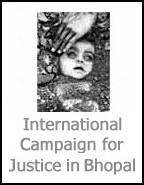



 Right to Life
Right to Life Medical Research
Medical Research Cleanup
Cleanup Dow Executives
Dow Executives Compensation
Compensation  'Return to Sender'
'Return to Sender' Clean Water
Clean Water Stopping Dow in India
Stopping Dow in India Other Victories
Other Victories